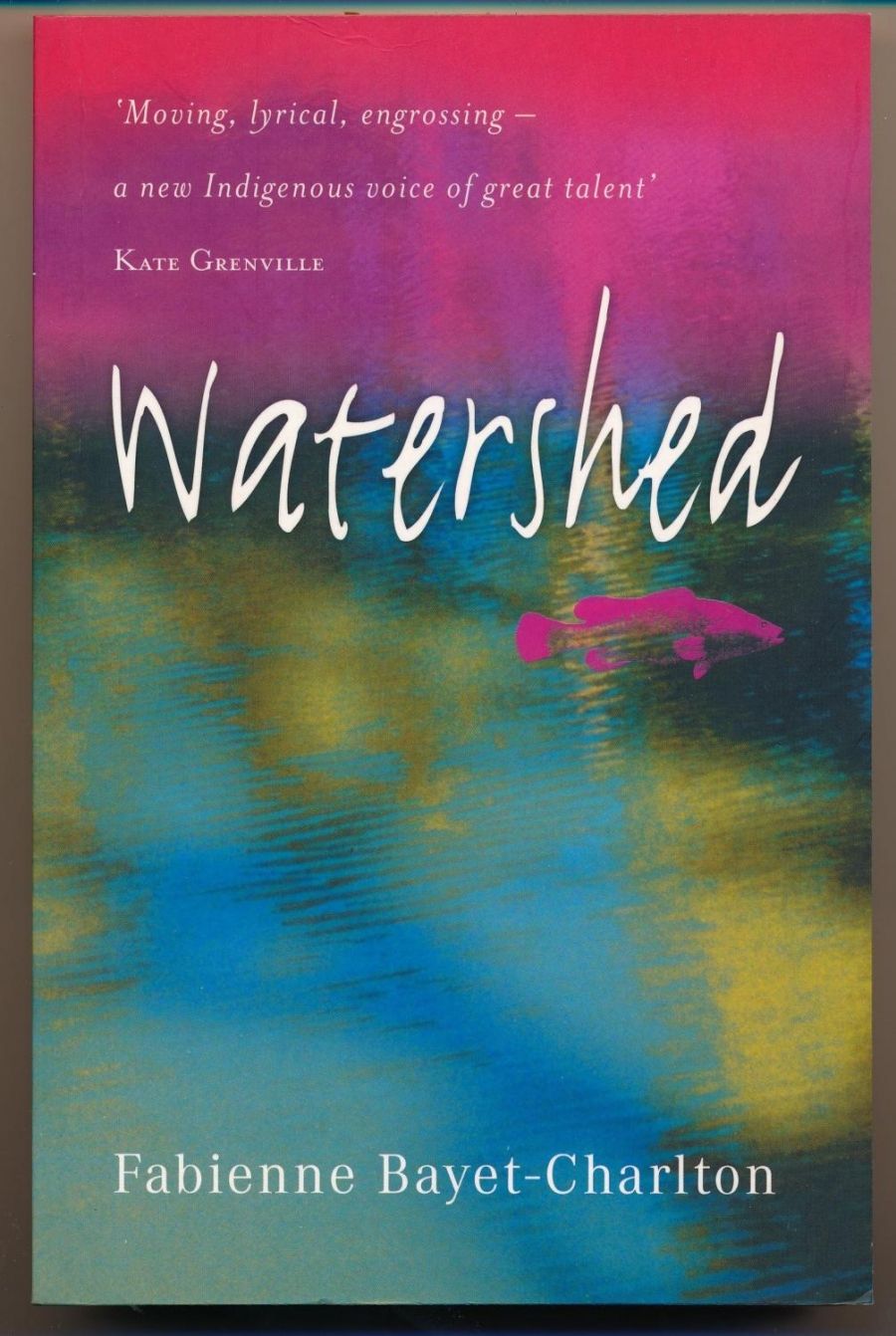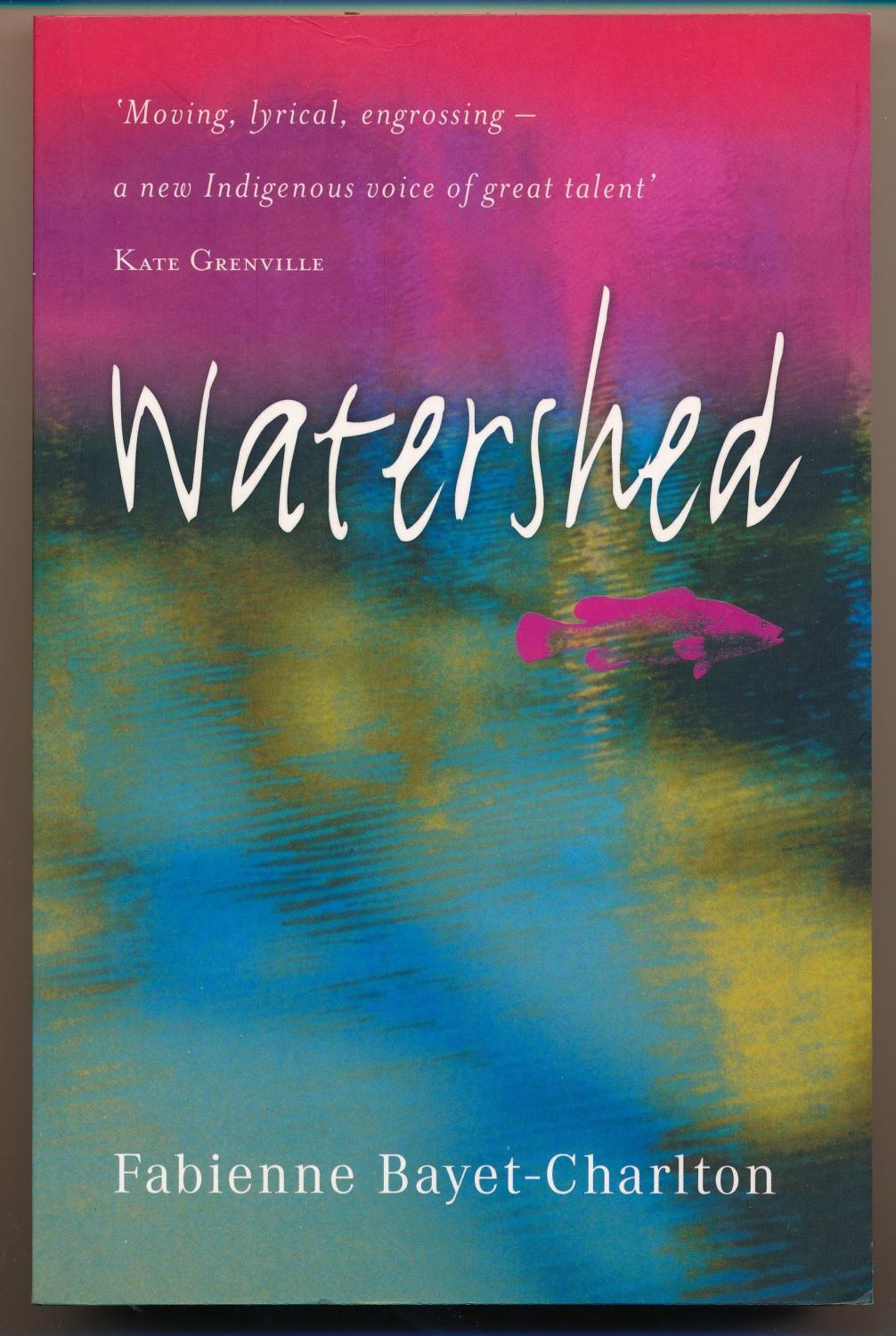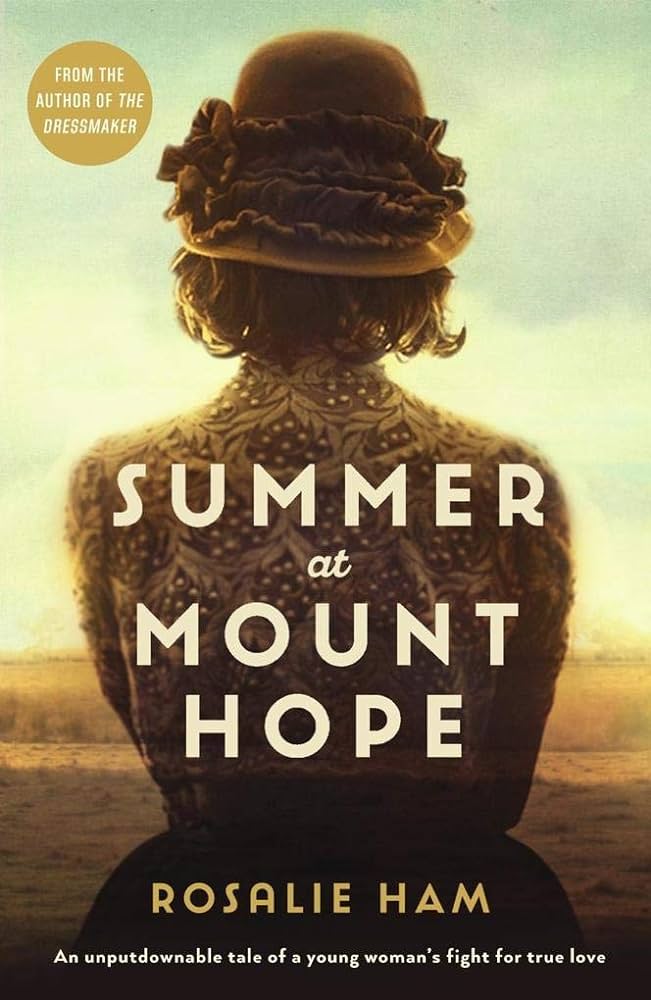
- Free Article: No
- Contents Category: Australian Fiction
- Custom Article Title: Parched romances
- Review Article: Yes
- Article Title: Parched romances
- Online Only: No
- Custom Highlight Text:
Fabienne Bayet-Charlton’s Watershed begins, ‘… such is the realm of water. It cradles yet suffocates. Warms and cools us. Sustains, nurtures and kills us.’ Indeed, the bonds and binaries of the element are central to this narrative – not simply the presence or lack of literal water, but also fierce emotional currents that threaten to submerge its main characters.
Set in contemporary South Australia’s Murraylands, Watershed centres on ex-champion swimmer Eve Buenetti, who is lost in a barren psychological terrain following the presumed drowning of her son, David. The novel also explores her husband Marconi’s response to the tragedy, and the tangled rivalry and sexual tensions between Eve, Marconi and his brother Victorio, the womanising town mayor. As in many explorations of rural communities, tangential storylines evolve, providing a break from the Eve–Marconi narrative and insight into other town dwellers, such as cryptic newcomer Jasmine.
- Book 1 Title: Watershed
- Book 1 Biblio: IAD Press, $22.95 pb, 256 pp
- Book 1 Cover Small (400 x 600):

- Book 1 Cover (800 x 1200):

- Book 2 Title: Summer at Mount Hope
- Book 2 Biblio: Duffy & Snellgrove, $30 pb, 296 pp
- Book 2 Cover Small (400 x 600):

- Book 2 Cover (800 x 1200):

The parched expanse of the Australian rural landscape is used as a metaphor for the hostile sites of loss and yearning occupied by its inhabitants. The narrative undercurrent explores the effects of drought on local water-dependent agriculture. The drying river and oppressive temperatures are entwined with the personal struggles of outback life and the heat of illicit sexual liaisons.
Bayet-Charlton’s language is rich in original imagery; tyres melt into the bitumen ‘like fat black marshmallows’. However, the writing is more concerned with a lyrical evocation of characters’ internal lives and inner voices than with narrative progression; lapses into dream, flashback and fantasy can be slightly bewildering at times. Newspaper and television headlines detailing known events are used to contemporise Watershed and break the hothouse of Eve’s sadness, which keeps her ‘in a bubble of glass and sound, isolated from the flesh and heat of the outside world’, and threatens to become unbearably oppressive for the reader.
Eve and Marconi’s relationship is saturated with aimless grief – Marconi ponders how ‘pain lingers, annoying. The loneliness of the empty paddocks suffocates him. What am I doing here? What’s the point?’ An existential helplessness drowns the couple in silence. Eve exists in alcoholic denial, a melancholic wine-drenched unreality where David’s disappearance three years earlier has not occurred. Her inner voice is that of her dead child, disturbingly annotating her every action, demonstrating how ‘history drags you under. Keeps you rooted to the same spot forever.’ Alcohol and adultery are her addictive escapes, bringing her ‘release from the boring, ordinary bleak sunlight outside that highlighted the wrinkles of her skin, the texture of her grief’. Eve’s swimming squad motto, ‘what does not kill you, makes you stronger’, is potentially true for Bayet-Charlton’s characters, too – if only they could assimilate negative experience and be bolstered by it.
The bereaved couple’s depression is like a dropped stone in a stagnant lake, as their hopelessness ripples out into the community. Even self-assured Victorio eventually falters, directionless. Marriage is presented as a mere settling for something less than the passion once encountered. Marconi wonders ‘whether it’s worth breathing these days. Is it even worth continuing. The way the hot air sucks the moisture out of every breath.’ And truly, this bleak narrative – so desperate, brutal, hyper-real that vague comic elements cannot hope to lift it – could make the reader wonder if any relief or recuperation exists for the characters.
While the Murray River is Eve’s prison, it is a possible avenue of escape from a provincial domestic fate for Summer at Mount Hope protagonist, Phoeba Crupp. Unlike Eve, however, Phoeba is full of endurance and optimism in the face of hardship and tragedy.
Rosalie Ham’s story takes place in a town near Geelong, Victoria, in the summer of 1893–94. Set out in diary-like entries, it details two months of intense change in Phoeba’s family and their farming community. What ensues is an outback Pride and Prejudice: Ham introduces an Austenesque cast of captivating characters, who inhabit a narrative structure based around traditional aims accompanied by unexpected setbacks, dark secrets and eventual resolutions. As in Austen’s oeuvre, family dynamics revolve around mother Maude’s desire to see her daughters marry well and to submit to society’s expectations. Phoeba is immediately likeable, a modest, cynical girl who aims simply to pursue a ‘bearable’ existence. The resulting conflicts between Phoeba and the coquettish, self-absorbed Lilith provide an entertaining insight into sibling rivalry, particularly between adolescent sisters.
Ham’s laudable attention to detail suggests that this is a well-researched text. Use of appropriate terminology for shearing and harvesting, and authentic naming of characters, are convincing features. The addition of satirical humour to this narrative-driven novel makes it an effortless read. That is not to imply that linguistic complexity is lacking; Ham’s use of simile is striking and ideal: a vicar’s hand-shake is ‘a grip like warm raw chicken’, and Phoeba’s dread is ‘a feeling like having eaten too much fresh bread and jam’. An unusual element of Ham’s text, and a trait rare in much fiction, is that scents are described intensely: aromas such as ‘warm air saturated with sweet lanolin and foul sheep shit … tepid, moist wool’ build a vivid image of the characters’ environment.
Central also to the narrative are Australian agricultural concerns such as shearing, crop harvest, grape glut and drought – ever-present themes in Watershed, too. Like Bayet-Charlton, Ham presents a careful impression of a country that has developed by living off the land, and at the mercy of the elements. The parallel storyline to Phoeba’s emotional development is that of the industrialisation of agricultural processes and the resultant laying-off of seasonal workers, widening of class divides, wage wars and violent strikes. With its detailed focus on very localised Australian concerns, Ham risks marginalising the book’s international appeal, yet the inclusion of universally engaging romantic storylines probably counteracts this.
Despite being an almost formulaic period novel, Ham’s work is captivating. There is a reason such storylines are popular and enduring: we find in them a compelling, roman-tic escape. Again, newspaper snippets are included as a stylistic device, grounding the narrative in a context of global events such as the recession that trickles down through the farming community in shocking headlines. Outspoken, progressive Aunt Margaret achieves a similar goal, introducing the suffragette movement and empowering Phoeba’s own beliefs. Reflections on the role and value of marriage abound. Although Phoeba believes that marrying for stability is ‘like taking the highest paid job at the abattoirs’, Ham’s characters realistically do not move beyond the options for women of the period, who were limited to a union based on wealth, convenience and social standing rather than love.
Summer at Mount Hope is a passionate and tender story because it takes place in a world where sex is not fully described or admitted, where Phoeba’s desire for the elusive Rudolph Steel pushes her ‘outside of herself’, and where secrets, raw emotions and misconduct are stifled and concealed. It is a charismatic tale of tragic love, a wrenching melodrama in which women are ‘exiled … standing on the balcony watching for someone to come – someone who will come with someone else’. It is, overall, a refreshing portrait of people who, amidst all the regret, longing, ‘lost fortunes’ and ‘dashed expectations’ of their existence, choose to ‘simply make the best of it’.


Comments powered by CComment